Foreign policy. A balancing game.

Brazzaville is allied with China, does not renounce France and, at the same time, cultivates relations with Russia.
Due to its geographical position in the heart of Africa and its history as the seat of government of French Equatorial Africa during colonisation, the foreign projection of the Republic of Congo remains one of the most interesting and most relevant on the continent.
For France, Congo was not a colony like the others. General Charles de Gaulle installed the capital of “France-libre” in Brazzaville, which resisted Nazi occupation and the Axis forces (1940-1944). It was also from the current Congolese capital that the father of the Fifth French Republic announced the autonomy project for the colonies in the aftermath of the Second World War. Of course, there was no talk of independence yet – de Gaulle’s proposal was limited to autonomy under the sovereignty of France – but the road to emancipation was open.
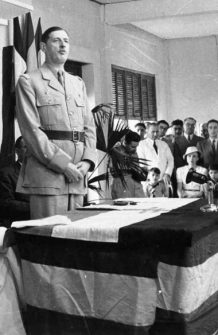
General de Gaulle giving a speech at the opening of the Brazzaville Conference, 30 January 1944. Archive
It is precisely this historical peculiarity that influenced the country’s foreign policy after achieving independence in 1960. The logic of African independence was based, for France, on the following principle: to create the matrix of a modern state that could integrate into the contemporary world, but with French influence at its centre. Paris thus laid the foundations of the system that would later go down in history as the main instrument of neocolonialism, namely Françafrique. This type of scenario soon changed, however, in Congo, thanks to the intervention of a political and military class that did not accept independence under the tutelage of France.
In 1963, President Fulbert Youlou was overthrown in a coup d’état; a Marxist-Leninist regime was established in the country and Congo, in the Cold War framework, entered the orbit of the bloc of socialist countries, with only a declared non-alignment and forced choices of alignment. After Youlou, three more presidents followed, until 1979, all of whom came to power directly through coups or following a coup d’état: Massamba-Débat, Marien Ngouabi and then Sassou-Nguesso, the current head of state. However, it should be remembered that his regime was interrupted for five years, between 1992 and 1997, by the first free elections in the country. His time as an exile in France and his return to power after several months of conflict.
Sassou-Nguesso, always welcome at the Elysée
Under Sassou-Nguesso, as pragmatic and cynical as ever, Congo has maintained close ties with France, benefiting from its economic and military aid. However, this relationship has also been marked by accusations of corruption and nepotism. Françafrique has often been criticised for its lack of transparency and for favouring the interests of elites over the development of local populations. In a way, however, it has borne fruit: France remains today one of the main foreign investors in Congo, alongside countries such as China and Italy.
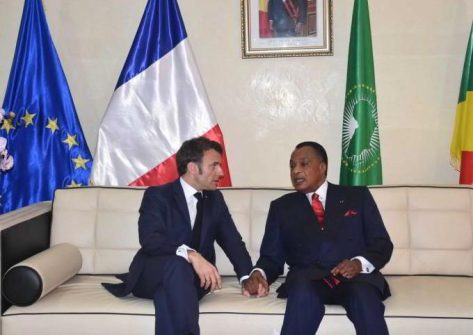
The Congolese president, Sassou Nguesso, met with the French president, Emmanuel Macron. The two countries have maintained close ties, benefiting from France’s economic and military aid. Courtesy, Congolese Pres. Office.
According to the Banque de France, the total stock of French foreign direct investment in the country stood at around 2.4 billion euros in 2023. Paris is also Congo’s second-largest supplier after China, with a market share of 10.5% in 2022.
However, trade between the two countries has steadily declined over the past ten years, while the crisis that followed the collapse of oil prices in 2014 caused the interruption of a series of promising export projects on which Congolese companies had positioned themselves. Last but not least, Sassou-Nguesso travels to France regularly.
This is despite the ongoing trials relating to the so-called “biens mal acquis”, illicit assets accumulated in the European country.
Between China and Russia
Relations between Sassou-Nguesso and China are characterised by close political and economic cooperation. Since the establishment of diplomatic relations in 1964, the two countries have strengthened their ties in various areas. These relations have allowed Congo to benefit from numerous Chinese investments, particularly in the construction of basic infrastructure and financial loans.
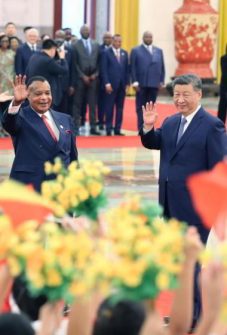
Xi Jinping, with Sassou Nguesso. The relation with China has allowed Congo to benefit from numerous Chinese investments, particularly in the construction of basic infrastructure and financial loans. Courtesy, Congolese Pres. Office.
China has been Africa’s main trading partner for 14 years, and trade between the two regions reached a record level of 282 billion dollars in 2023. Trade along the Brazzaville-Beijing axis is worth several hundred million dollars a year. Discussions between China and Congo are ongoing. In February 2024, on the occasion of the 60th anniversary of relations between the two countries, their respective leaders exchanged messages of congratulations, underlining the importance of their partnership. The partnership along the Congo-China axis concerns the training of leaders, the development of infrastructure and the exploitation of raw materials.
Finally, during Sassou-Nguesso’s state visit to China in September 2024, new agreements were signed, particularly in the context of the economic partnership and the major Chinese Belt and Road Initiative infrastructure.
The relationship with Russia also has a peculiar history. With the fall of the Berlin Wall, the advent of pluralist democracy in Africa and the disintegration of the USSR, the Russian Federation lost its grip on some African countries that were part of the communist bloc. Relations between Moscow and the countries of the former Soviet camp have experienced a sort of “vacuum”.
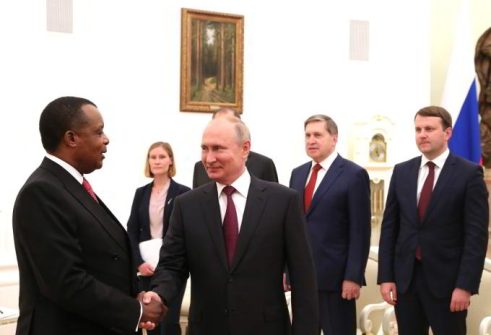
Vladimir Putin with Sassou Nguesso. The two countries have maintained fruitful relations. CC BY 4.0/The Kremlin
Diplomatic relations between Congo and Russia, on the other hand, have never suffered significantly. Except for the parentheses opened by the changes brought about by perestroika, the two countries have maintained fruitful relations. This was already the case when Congo was known as the People’s Republic between 1969 and 1992, and almost 7,000 Congolese students studied in the USSR.
Decades later, Congo was one of 35 countries that refrained from calling on Russia to “immediately cease the use of force against Ukraine” at the United Nations General Assembly.
The African scenario
Congo is active in resolving the Great Lakes crisis and is a signatory to the Addis Ababa Framework Agreement for Peace in the Democratic Republic of Congo and the Great Lakes Region. A geographic and cultural neighbour of the DRC with its capital Kinshasa, Sassou-Nguesso actually maintains more cordial relations with Kigali, as also demonstrated by recent bilateral agreements between the two countries for the partial transfer of territory to Rwanda.
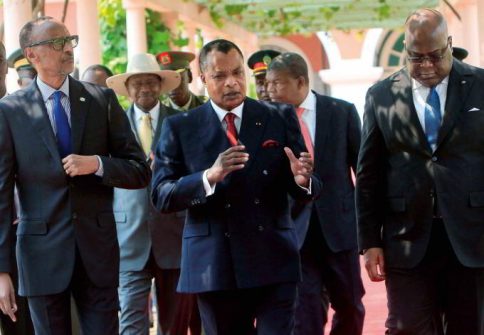
From left. President of Rwanda, Paul Kagame, Denis Sassou-Nguesso of Congo and RD Congo’s president, Félix Tshisekedi. Congo is active in resolving the Great Lakes crisis. Courtesy, Congolese Pres. Office.
Precisely for this reason, the Congolese president has not been able to play the role of mediator in the conflict that continues between the DRC and Rwanda, which has instead been entrusted to neighbouring Angola. Sassou-Nguesso also participated in the political process to end the crisis in the Central African Republic (2014-2016), in particular as president of the follow-up committee of the 2013 Libreville agreements. Congo contributes troops to the police component of the United Nations Mission in the country, MINUSCA. Finally, the Congolese head of state chairs the African Union High-Level Committee on Libya and is working for national reconciliation and the fight against terrorism in the North African country. (Open Photo: 123rf)
Jean-Léonard Touadi



